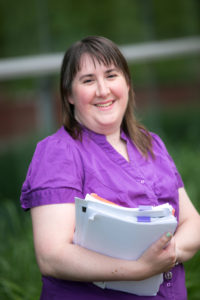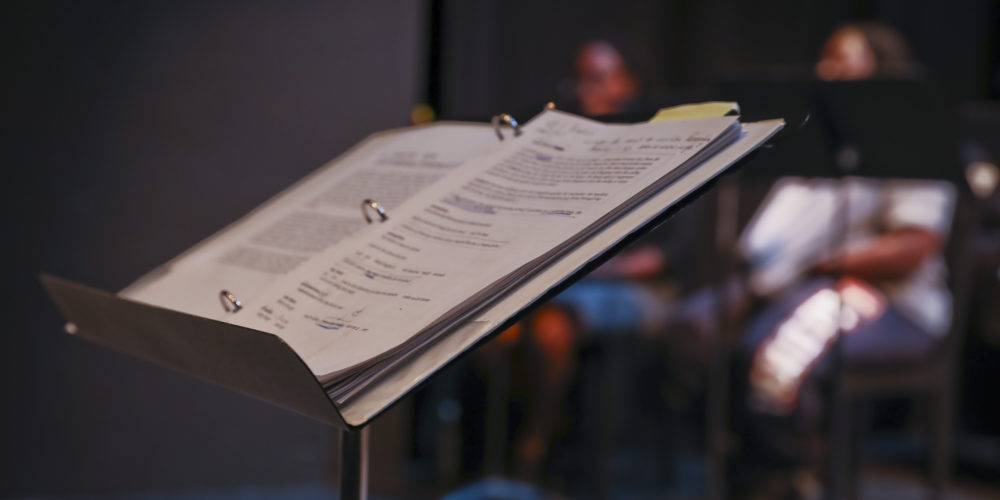24 Apr Inside the Evolution of the BAPF Selection Process

The Challenge of Cultivating a Garden of New Plays
by Heather Helinsky, Playwrights Foundation Literary Manager
Prior to becoming Literary Manager for Playwrights Foundation this season, one of my great joys at the Kennedy Center was the ability to connect emerging writers with their first job or production opportunity. Work brings all of us meaning – and being the conduit for connecting someone with meaningful work has always made my dramaturgy heart leap. Having the opportunity to do the same for Playwrights Foundation and connect writers with perhaps their first development opportunity is what drives me daily. Yet dramaturgs often pose questions, and in this job, my question now is how to make the experience better for everyone who applies.
Over fifteen years of work as a dramaturg, I know so well the disappointments that come when applying to a large festival. I’ve listened over the years to writers who don’t get their work into a development opportunity, and I have some ideas arising out of concerns they’ve voiced. As a dramaturg, I often question why we have a system for writers which operates in a certain way, and I think now is a good moment to re-visit some systemic questions in American regional theatre.
The hard, unfortunate news is that approximately 80% of writers who apply to a development festival like Playwrights Foundation won’t make it through to the Semi-Finalist round. Deciding which plays move forward and which do not is a difficult, heart-wrenching process from this side of the equation. A lot of plays are challenging, relevant, and full of potential. How can we choose when art, by its nature, is completely subjective? What myths about our process do we have to de-bunk? And why does it seem to take so [damn] long every year for a festival of our size to deliberate?
Early in my career, I advised a student dramaturg at the University of Arizona who was working on a production of Candide. I sat through a lot of rehearsals of that musical, and it was the songs sung by Candide’s open-hearted, optimistic protagonist about yearning for a “best of all possible worlds” that captured what the work of a literary team is like. Since I am new to Playwrights Foundation this season – and I was hired after the submission process had closed – I brainstormed how to set up this year’s process for success. And success, for me, means that every writer is getting serious consideration before we make any decision. It takes time.
Every play has its own world and its own rules for that world, and our readers must evaluate it. Making comparisons between plays is like comparing planets in our solar system or traveling through different countries. How can you choose your favorite? Each play is its own ecosystem, so discovering what’s working or not with each play is like the ups and downs encountered on any road trip. And since it’s humanly impossible for me to personally go on that journey – reading such a volume of plays in a short three or four month period of time – I had to carefully select National Committee readers who are caring professionals and who want the “best of all possible worlds” for playwrights.
If we can’t give development opportunities to everyone who applies, at least our National Committee should be made up of readers who are first and foremost passionate advocates and allies of contemporary playwriting. To take care of all our applicants by finding 150 readers from all over the country who are professionals connected to other potential opportunities – that is our priority.
Authenticity is an important value to us, so it was vital that our National Committee and Bay Area Literary Council was composed of theatre professionals who were as diverse as the writers who applied. It’s an intentional choice to invite readers who can relate to a wide variety of characters and stories. Diversity and inclusion mean many things – racial identity, gender identity, various socio-economic backgrounds, artists from the disability community, and regionally-specific voices that represent different cultures within the U.S. When I reached out to readers – many of whom I’ve known for a long time and assumed they had a voice this process – I heard: “Thank you for asking me. I have always wanted to read for a new play development festival, but I’ve never been asked for my opinion.”
Every play submitted is read twice by the National Committee. After the first reading, our literary team reports back about each play, and then the next level of creating the “best of all possible worlds” is to try matching each play with a second reader who has some expertise in that kind of work.
For example, a concern I’ve heard from writers is that absurdist comedies have a hard time getting through the system over realistic family dramas. So I wanted to make sure there were professionals within the National Committee that absolutely loved absurdist plays and had a deeper understanding of the form. Perhaps in the future, we’ll find a way to get to this layer of analysis faster, but this year, it meant that my team played “second-round matchmaker” between a play and a reader. It may be helpful that the first reader of any play is “cold” and has the ability to evaluate all styles, forms, and aesthetics. But I want to make sure the second reader can analyze the play from a deeper level of expertise and report back to our team if the play, on its own aesthetic world-building terms, was ready to move forward.
And there’s always the hope that connecting someone who is an expert in directing, say, magical realism plays with a writer who has written a magical realism play will lead somewhere. Perhaps if we end up passing on it, the National Committee or Bay Area Literary Council reader will now be aware of this project and reach out to the writer on their own.
A part of this process that unfortunately we can never truly document is how much our team is cheerleading and advocating for the plays that move on to each round – and how difficult it is to leave some plays behind. Another important value in our process is that it’s idealistically democratic: It takes many voices and opinions to build consensus. Encouraging our process to operate like a working (as opposed to dysfunctional) democracy makes for a lot of internal discussion and debate. It’s rigorous. Emotions run high as we make subjective choices. I do feel satisfaction that the work we did this year was focused on enabling theatre-makers coming together in community to debate the plays, and we heard a lot of opinions and perspectives which led us to our final choices. Building community, at a time where we’re all living in separate spaces due to the coronavirus pandemic, added another profound layer of meaning to our season.
Of course, if Playwrights Foundation is going to “make our garden of writers grow”, our new literary team needs to also honestly evaluate criticism and flaws in our process. Our staff is small, and some of us work part-time. We wish we could write everyone a personalized letter, encouraging them to keep working. We’re appreciative for all the worlds we traveled to this season, guided by talented writers. We recognize each writer’s work, and we’re aware – like Voltaire’s optimistic youth – that there are a lot of challenges to address. Yet we hope that the changes and efforts we made this year will be noticeable, as we work the best we know how to make the writer valued at every step of the journey.
Heather Helinsky, Literary Manager (she/her) is a Philadelphia-based dramaturg that playwrights have recognized as “especially adept at freeing energies in unexpected ways. She encourages discovery.” Nationally, her dramaturgical work has been seen at the Accessible Theatre, American Repertory Theatre, the Apothetae, Arizona Repertory Theatre, Arkansas New Plays Festival, Athena Project Festival, Best Medicine Rep, Borderlands Theatre Company, City Theatre, Colorado New Play Summit, Denver Center, Great Plains Theatre Conference, James Madison University, The Kennedy Center, The Lark, Lee University, Moscow Art Theatre’s American Studio, Omaha Community Playhouse, Pennsylvania Shakespeare Festival, Philadelphia Theatre Company, Phoenix Theatre, Pittsburgh Irish and Classical Theatre, Pittsburgh Public Theatre, Plan-B Theatre, Plays and Players of Philadelphia, PlayPenn, Salt Lake Acting Company, Telluride Playwrights Festival, Unexpected Stage, Woolly Mammoth, Venus Theatre, and the 6NewPlays collective in San Francisco. For two seasons, she served as a Barrymore Judge for Theatre Philadelphia, which adjudicates 60-100 productions in the Philadelphia region and is currently a board member for LMDA as VP of Freelance. She’s read and evaluated scripts for The O’Neill, PlayPenn, Great Plains Theatre Conference, Jewish Plays Project, Seven Devils and Sundance Theatre Lab. She has been the Literary Manager of the Pittsburgh Public and PICT Classic Theatre. For the Kennedy Center, Heather mentors student dramaturgs, regionally and nationally, since 2012, and reads for the David Mark Cohen & Steinberg award. Other Kennedy Center projects include the Undergraduate Playwrights Workshop, the VSA Discovery Series, the Page-to-Stage Festival, and two seasons of the MFA Playwrights Workshop for NNPN. She was a Visiting Professor of Dramaturgy at Carnegie Mellon (’12-’13), University of Arizona (’07-08), Lesley University (’15-’16) and Brooklyn College (’15) and taught a workshop in Spring ’19 to the Yale School of Drama 1st & 2nd year dramaturgs. She holds an MFA in Dramaturgy from the ART/Moscow Art Theatre Institute for Advanced Theatre Training at Harvard ’07, where she studied with Playwrights Foundation founder Robert Woodruff. www.helinskydramaturgy.com



Wayne Paul Mattingly
Posted at 19:12h, 25 AprilDear Heather–Thank you for posting this uplifting piece. It’s gratifying to hear a bit of the approach–both practical & philosophical–from behind the scenes.
To your health–cheers!
WPM
Jonathan Luskin
Posted at 19:29h, 25 AprilHi Heather,
As one of the “unselected” 80% this year, I can’t tell you how much I appreciate that you took the time to write this thoughtful article. It is some compensation to know how committed you and your team are to create the best possible process out of what is an extraordinary challenge. Thanks, and best of luck with the virtual festival.
-Jonathan
Roger Benington
Posted at 01:32h, 26 AprilThe democratic process of your selection process sounds especially invigorating and engaging for all of the 150 theatre makers who you include in the process, and I applaud you for the work that goes into this approach and for allowing us a glimpse behind the curtain, so to speak. I’m wondering if you might care to address the criteria you use to make your selections, or give the playwrights who submitted a sense of the issues that are debated around plays as you hone in on the finalists.
Heather Helinsky
Posted at 17:03h, 01 MayWe have a report that everyone fills out at the National Committee level, which prompts them to write a thoughtful assessment about what they feel is working or not working with the individual piece. There’s not a rubric of what makes a “good play”—it’s a collective decision made by a large group professional theatre artists nationally and from the Bay Area. We do take the development goals into serious consideration, so writers who can articulate specific development goals help all the readers make an assessment of where the play is at the time of submission. There’s also multiple layers of assessment on each play, which, for the 735 plays submitted this year, requires a lot of time and energy to discuss properly.
James Still
Posted at 23:01h, 26 AprilThank you, Heather, for the thoughtful, real, and compassionate essay. It’s always great to read about process. I appreciate your work and PF’s commitment to writers and new work.
Brigid Amos
Posted at 15:40h, 27 AprilAs a playwright, all I ask is that a reader consider a reasonable portion of the script. I was horrified recently by facebook comments in a group I belong to from people who claimed to be readers in various playwriting events. Many said things like “if it doesn’t grab me on the first page, I don’t read any further” or “if there”s a monologue on the first page, I won”t read any more of it.” Also mentioned was throwing it out if the first page is all stage directions. Some of them said they would read as much as five pages, and others thought that was too generous. I did not respond to those comments, but thought that this sounded like people deciding whether or not to buy an ebook on Amazon rather than readers with the responsibility of assessing a play. It was especially disheartening, when one thinks of the time and often fees that we put into submitting. It sounds as if your process is far more rigorous than what I’ve described, but I do think this is a general concern for many of us who have trouble getting past readers with these strong tastes and beliefs about what a play has to be. Thank you for endeavoring to remedy that.
Heather Helinsky
Posted at 16:30h, 01 MayIt is required for all of the National Committee readers to read the play in it’s entirety, until they hit the words “End of Play.” Then they have multiple questions to answer about the entire play. Our readers are passionate and thoughtful. There was one occasion where one reader who gave up after 20 pages, but I then disregarded that report and made sure the play got a more thorough read by another reader. Thanks for voicing your concerns, we’re on it.